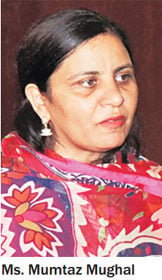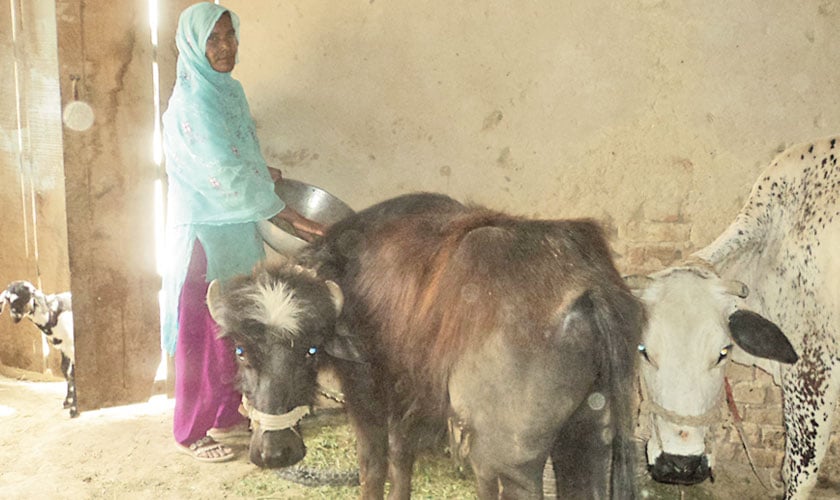Despite being in majority as workers and farmers, women face many barriers and their contribution in agriculture is unrecognized, unpaid, underrated and overlooked. You! takes a look...
Despite being in majority as workers and farmers, women face many barriers and their contribution in agriculture is unrecognized, unpaid, underrated and overlooked. You! takes a look...
Agriculture accounts for 20.9 per cent of Pakistan’s Gross Domestic Product (GDP) and employs 42.3 per cent economically active labour force. The leading industries of the country are also agro-based which further increases the importance of this sector. The Punjab province, which is the biggest province in terms of population, has fertile land and contributes the largest share to the agricultural production of the country.
No doubt, the agricultural force of the country is hardworking, committed and strives to get bumper yields throughout the year, especially in Punjab. Despite gradual mechanisation of this sector, it is still labour-intensive and involves a lot of manual work. Those who are familiar with the dynamics of this sector, know that most of the manual hard work is done by women, while men mostly do mechanised work and operate machines. But unfortunately, despite putting endless hours of work, women agricultural workers are taken for granted. They are denied of labour rights and paid scantily or not at all. Even in cases where they are paid, whatever they get in remuneration, lands into the pockets of men in the family.
This situation has been noticed by the rights groups within the country and abroad - triggering debate on how to help improve the situation. The emphasis of bodies working on making the world of work conducive for workers, regardless of their gender, is also on securing the rights of women farmers, as they are discriminated on the basis of their gender.
The women force in the agricultural sector in Pakistan has been neglected for ages, which is evident in the reporting on Generalised System of Preferences (GSP) Plus status related compliance. Pakistan has been granted preferred market access for its products by the European Union (EU), provided it complies with the long list of international conventions on human rights, labour rights etc. it has ratified.
Aurat Foundation is a national outreach-based women’s rights organisation with its countrywide presence in all four provinces and all 128 districts as well as in Azad Jammu Kashmir and Gilgit-Baltistan through its own offices, as well as, offices of its partner organizations, network groups and sub-contractors.
According to Mumtaz Mughal, Regional Head, Aurat Foundation, a need was felt during the reporting process that the state of agricultural workers, mainly the women among them, was not properly discussed and they were hardly mentioned. “Aurat Foundation (AF) and the European Partnership for Democracy (EPD) has launched a project, which will focus on policy research in the area of socio-economic rights of women working in agriculture in Punjab province, with a special emphasis on policy implementation. The scope of the research will be wide and entail determination of socio-economic rights of these women workers,” says Mughal.
Here, a situational analysis of the state of agricultural women needs to be discussed, as this will give an idea of what exactly are the challenges that have to be tackled. Around 93 per cent women in Punjab do not own agriculture land. Women spend around 12 hours to 15 hours a day on farming activities and half of them are engaged as farm and family labour. Around 75 per cent of these receive no payment for their work. Land reforms carried from time to time have failed to allot land titles to women as a right. Despite being in majority as workers and farmers, women face many barriers and their contribution in agriculture is unrecognized, unpaid, underrated and overlooked.
Land is measured as a precious asset, and socially and traditionally it is considered to be the honour of a family so it is not shared with women heirs. The lack of knowledge about modern technique and insufficient skill opportunities is another problem. All agronomic activities are conducted conventionally and manually by women farmers. Many have no access to milking machines, tractors, combine harvesters, threshers etc. They lack access to farm equipment, microcredit, agricultural information, agricultural training and extension services that results in far more manual labour for them than is required, hence creating health issues. Also, they have limited access to social safety nets. If the government grants loan to them, majority of these loans are used by the male heads. The very objective of empowering the women remains unfulfilled.

Dr. Javaid Iqbal Gill, a former official of the Punjab labour department and an expert on labour issues, fully endorses the plans. “There is no doubt they are among the most oppressed segments of the labour force. The farm activities in which women farmers participate are rice transplantation, paddy, wheat and corn harvesting, transportation of corn stalk, corn threshing, cotton picking, vegetable picking, fruit picking, flower picking, cutting and transportation of fodder, rearing and medical treatment of livestock etc. If they stop taking part in these activities, everything will come to a halt,” stresses Dr. Gill.
Moreover, several studies into the conditions of women farmers have been carried out in the past but the project in question will focus more on finding ways to streamline this project, compiling and presenting suggestions to the policymakers for implementation. “One such study titled, ‘Women in Rice Cultivation’, carried out by the Food and Agriculture Organisation (FAO) and the World Food Programme (WFP) came out with startling findings. A number of Focussed Group Discussions (FGDs) were also conducted in Multan as part of the study that revealed:
i) Men make decisions in all aspects of rice production: women only make decisions related to food preparation; ii) Men and women are partners in rice production: each has specific skills and expertise (e.g. women have the expertise in transplanting and seed storage while men have expertise in nurseries, pest management and marketing); iii) Women spend two or three hours for every hour men spend in rice production: the difference reflects whether or not harvesting is by hand or by combine: iv) All mechanised roles are performed by men: machines with engines are designed to be used by men and demand a man’s strength. There is a distinct gender gap in mechanization in rice production that increasingly brings men into time-efficient machine-supported roles while much less has been achieved in reducing the long hours of hand work done by women,” informs Dr. Gill.
According to Programmes Officer at European Partnership for Democracy (EPD), Leon Hemkemeyer, their partnership with Aurat Foundation for the project of women agricultural women workers is based on the model under which it facilitates the exchange of knowledge and good practices around the world while advocating for a stronger presence of democracy support on the European Union’s agenda. This operating model derives from the Integrated Support Programme for
Inclusive Reform and Democratic Dialogue (INSPIRED) supported by the European Union and a couple of other organisations.
“The idea to work on the advancement of the rights of women working in agriculture resulted from consultations with civil society in Punjab Province. It was conveyed that there is a relative lack of data on conditions within the agricultural sector. This applies in particular to the challenges and problems that female labourers face. Moreover, from discussions that were held with experts, journalists and government representatives, it appeared that there is a willingness to approach potential policy solutions on an inclusive multi-stakeholder basis - one that will include key policy-makers on the provincial level. This was a decisive factor in choosing the topic of the initiative.
“INSPIRED aims to conduct an inclusive and participatory policy dialogue on the socio-economic rights of women that work in Punjab’s agricultural sector. The objective is to reach a domestically owned policy assessment of the current state of affairs and to identify specific policy priorities that are agreed to by both policy-makers and civil society. This may include specific legislative proposals or solutions to make already existing mechanisms more effective.
EPD will provide institutional and technical support to Aurat Foundation. EPD’s method INSPIRED has been tested in several countries before, targeting a variety of topics primarily related to democracy and human rights,” explains Hemkemeyer.
Labour sector expert, Syed Hasnat Javed, who has carried out a situational analysis to form baseline for this project, shares that women’s participation in work, in rural areas, varies considerably across regions, but invariably women are over represented in unpaid, seasonal and part-time work and they are paid less than men, for the same work. “With the passage of time, male workers are largely moving to non-agricultural sector, whereas women have remained substantially in agriculture and the gender gap is found to be increasing. Historically, the agricultural development policies adopted by governments in developing countries were concerned more with the growth of production and marketable surpluses, changing crop patterns, increasing yields per acre etc. than with the socio-economic factors, employment aspect and equity particularly gender aspects of development,” asserts Javed.
As the Aurat Foundation-EPD project has taken off, one hopes for a breakthrough despite all odds and the difficulties involved in reversing a culture of male dominance. After all the rights of women agriculture workers are not just a wish list; these are mentioned and acknowledged in several UN and ILO Conventions.